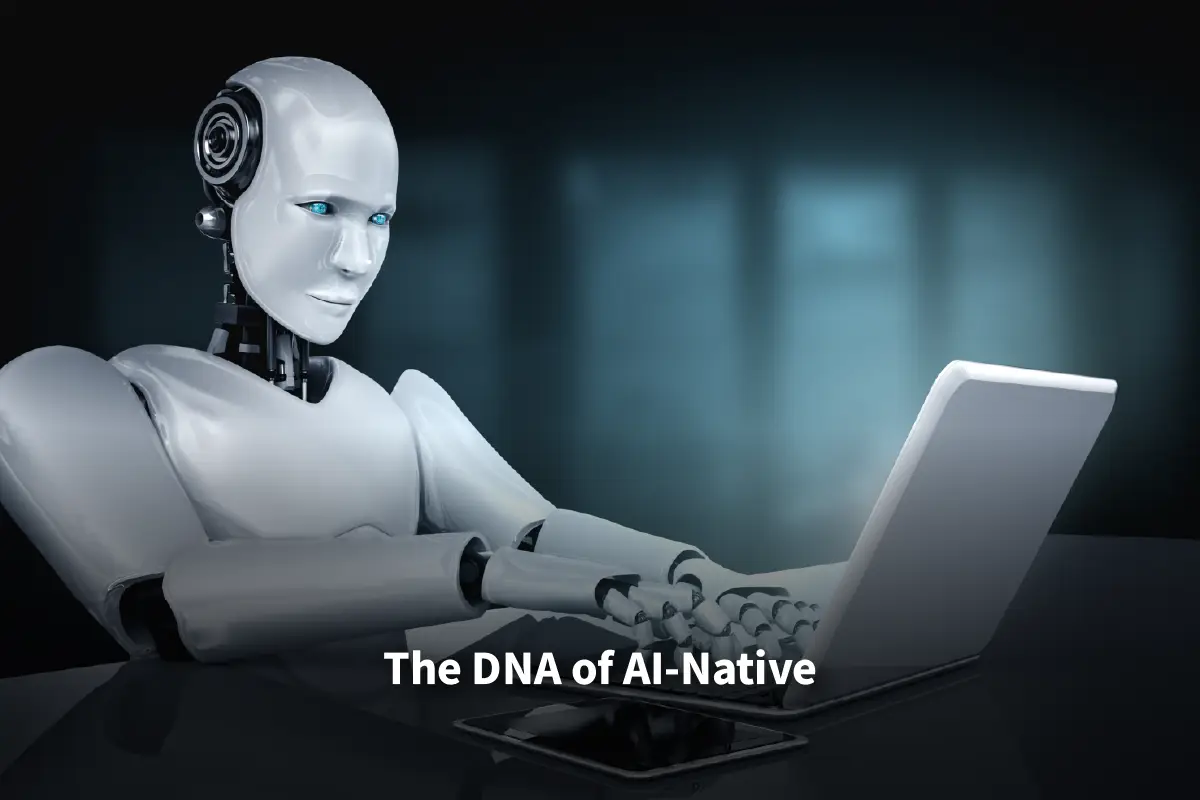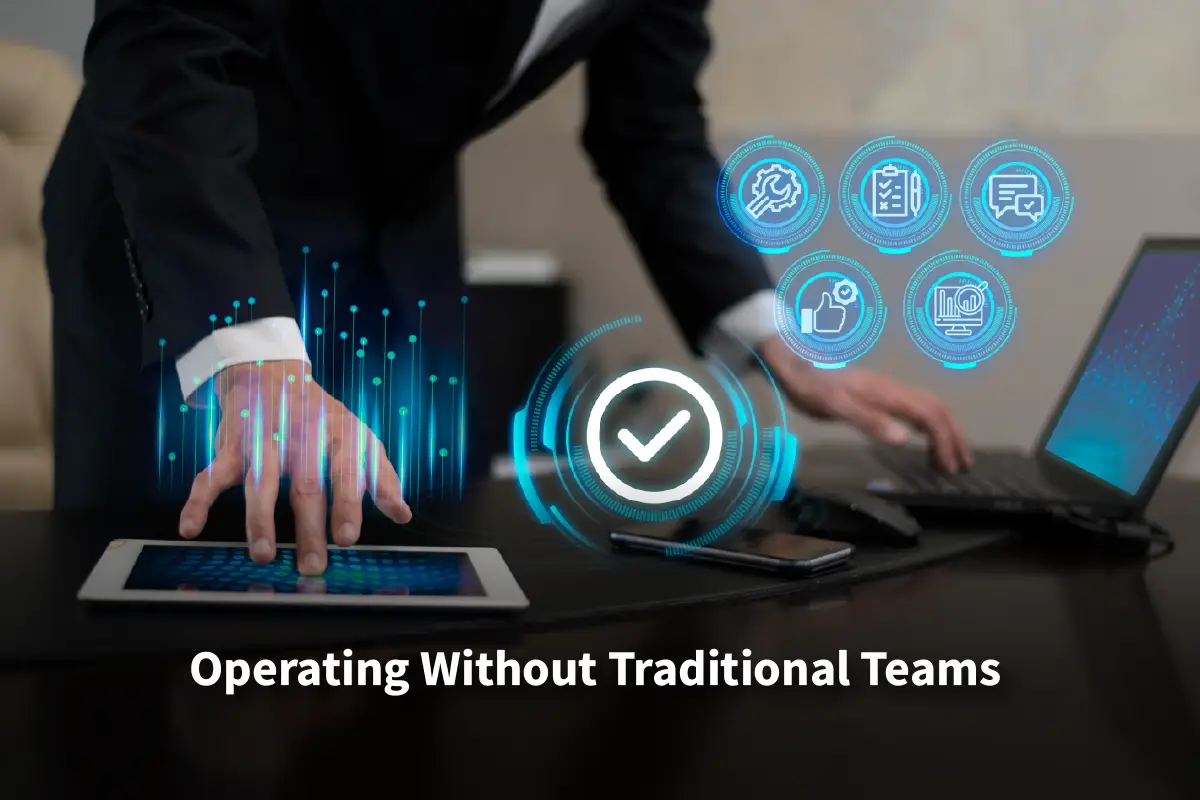何十年もの間、技術系企業の起業は明確な道筋をたどってきました。それは、先見の明のある創業者と強力なピッチデッキから始まりました。次に、私たちはシード資金を確保しました。そして、エンジニア、マーケティング担当者、オペレーション・スペシャリストからなるコア・チームを結成しました。そして、製品と市場の適合性を見極め、規模を拡大するハードワークが始まりました。これは人間中心のモデルであり、多大な資本と時間、組織の複雑さを必要としました。デジタルの世界では、新しいタイプの企業が台頭しています。それは、こうした常識を変えようとしています。AIネイティブ・スタートアップの時代へようこそ。これらの企業は、人工知能によって創造され、構築され、運営されています。人間のチームは非常に小規模であることが多く、場合によっては人間がまったくいないこともあります。これは単なる自動化ではありません。価値を創造し提供する新しい方法なのです。
AIネイティブのDNA

このシフトを理解するためには、AIを単なる生産性向上ツールや追加機能として捉えるだけでは不十分です。従来のハイテク企業は、機械学習をレコメンデーション・エンジンやチャットボットに活用するかもしれません。AIネイティブの新興企業は、最初から中核業務と戦略に人工知能を組み込んでいます。AI は 製品、主要な労働力、そしてしばしば重要な意思決定者。
AIがすべてを行う会社を想像してみてください。アルゴリズムが市場のギャップを見つけ、製品のアイデアを生み出します。コードを書いて配備するのもAI。顧客サポートや顧客獲得もAIが行います。金融取引の管理やパートナーシップの交渉も行います。高度なAIシステムによって、すべてがスムーズに機能します。人間の役割は大きく変わります。タスクをこなすことから、それを監督することへ。人間は戦略的なガイダンスを提供し、倫理基準を確保し、例外的なケースを管理します。AIネイティブのパラダイムは、すべてビジネスに関するものです。これらのシステムは自律エージェントとスマートシステムで構築されています。これらのシステムは自らを指揮し、時間とともに進化します。
このビジョンはもはや机上の空論ではありません。2024年の時点で 73% 調査によると、世界のアーリーステージのスタートアップ企業のうち、少なくとも1つの中核機能にジェネレーティブAIを統合していると報告しています。
こちらもお読みください: 2030年までに世界の自動車産業を変える日本のイノベーショントップ5
従来のチームなしでの運営

このモデルは大きな転換を示唆しています。従来の人的労働力を削減、あるいは廃止する可能性さえあるのです。一般的にチームを必要とする機能について考えてみましょう:
- 製品開発: AIシステムはコードを書けるようになりました。インターフェースを設計し、機能をテストします。また、ユーザーからのフィードバックによって改善されます。AI主導のSaaSツールを開発するスタートアップ企業は、AIエージェントを1人のエンジニアが管理していることがよくあります。これらのエージェントは、開発チーム全体の仕事をすることができます。 ギットハブ 例えば、Copilotはすでに180万人以上の開発者がコーディングを高速化するために使用しており、サポートされている言語でユーザーによって書かれた46%のコードに関与しています。
- マーケティング&セールス: AIがすべてを処理します。ターゲットを絞った広告コピーを作成し、さまざまなプラットフォームでキャンペーンを実施します。また、リードの絞り込み、AIアバターによるデモの予約、初期条件の交渉も行います。AIはファネル全体を処理します。顧客獲得は、データと予測アルゴリズムによってほぼ自動化されたプロセスになります。
- カスタマーサポート: AIチャットボットとバーチャルエージェントは、定型的な質問にいつでも迅速に対応します。人間が介入するのは、最も困難な問題や最もデリケートな問題に限られます。これにより、大規模なサポートセンターの必要性が削減されます。IntercomのFinやZendeskのAIボットのようなAI駆動型ツールは、以下のような問題を解決します。 80% 人手を介さずにサポート・チケットの数を削減することで、運用コストを約30%削減し、応答時間を短縮しました。
- オペレーション&ファイナンス:AIは物理的な商品の在庫を管理します。ロジスティクスを最適化し、請求と支払いを処理し、財務予測を実行します。また、継続的なモニタリングで規制遵守を保証します。CFO」はリアルタイムでキャッシュフローを分析し、最適化を提案するアルゴリズムかもしれません。AIベースのロジスティクスツールは、ラストマイルの配送コストを最大20%削減します。 マッキンゼー.
結果は? スタートアップ企業 お金を稼ぐ、顧客を獲得する、製品を改善するといった大きなマイルストーンに到達します。このような企業は小規模なチームを持つことが多く、システムの設計と管理を行う創業者は1人か2人ということもあります。最大のコストである給与や諸経費が削減されるため、資本効率が向上します。AIシステムは疲労することなく24時間働き続けるため、市場投入までのスピードは飛躍的に加速します。
ファウンダーレス・フロンティアの挑戦
この急進的なモデルには、複雑さやハードルがないわけではありません。AIネイティブ・ベンチャーの構築には、創業者に根本的に異なるスキルセットが求められます。AIの能力と限界をしっかりと把握することが重要です。また、システム・アーキテクチャやプロンプト・エンジニアリングのスキルも必要です。これらはAIエージェントを効果的に管理するための鍵です。さらに重要なのは、強固な倫理とガバナンスの枠組みでしょう。疑問は尽きません:
- 意思決定の説明責任:AIシステムが重要なビジネス上の決定や顧客に影響を与えるミスを犯した場合、誰が責任を取るのでしょうか?責任の所在を明確にすることは不可欠ですが、複雑です。
- バイアスの緩和:AIシステムが偏ったデータから学習すれば、差別を蔓延させたり悪化させたりする可能性があります。バイアスを監視、監査、修正することは、倫理とブランドの信頼にとって重要です。
- セキュリティ&コントロール:AIシステムに大きな自由を与えることがもたらすもの セキュリティ 迅速なハッキング、データ漏洩、意図しないAIの行動に対する強固な保護措置は極めて重要です。創業者は最終的なコントロールと介入能力を維持しなければなりません。とは IBMの 2024 Cost of a Data Breach(データ漏洩の2024年コスト)」レポートによると、AIを活用した脅威検知により、漏洩の影響コストは平均で176万USドル削減されました。
- 投資家の懐疑心: 従来のベンチャーキャピタルは、しばしばチームに賭けます。しかし 60% 2024年第1四半期に世界のVC資金調達の強力な経営効率の実証。これは、人的資本の少ないモデルでも成功し、成長できることを投資家に納得させるのに役立ちます。また、明確なガバナンスと中核となるAI技術の強さを強調しましょう。このアセットクラスに特化した新たな投資テーマが登場しています。
- 人間の要素:純粋なAIは、人間の理解力、創造性、人間関係のスキルに本当に匹敵するのでしょうか?これは、複雑なB2Bセールスや戦略的パートナーシップにおいて特に重要です。最高のAIネイティブ企業は、本当に重要なところで人間の才能を活用しています。
進化する風景
まだ始まったばかりですが、具体的な例がその可能性を示しています。AutoGPTベースのベンチャーのような会社を考えてみましょう。創業者は目標を設定します。そして、AIエージェントがその目標を分解します。AIエージェントは、オンラインやソフトウェア上で調査や計画を立て、タスクを実行します。これらは自律性の限界を押し広げる初期の実験です。
シンセティック・メディア・スタートアップ: これらの企業は、AIを使ってマーケティングビデオやカスタム広告、教育コンテンツを制作しています。人間の助けはほとんど必要なく、最初のクリエイティブなアイデアと品質チェックだけです。彼らの「制作チーム」はアルゴリズムです。例えば、Synthesiaは、多くの企業で使用されている完全AI生成のビデオコンテンツを可能にし、以下の方法で制作時間を大幅に短縮します。 62%.
アルゴリズム取引とフィンテック:企業は取引戦略の実行にAIシステムを利用しています。これらのシステムはポートフォリオを処理し、ローンを引き受けます。日々の意思決定に必要な人間の入力は最小限です。コアバリューは自己改善アルゴリズムです。
より広いビジネス界への影響
AIネイティブの新興企業は単なる小さなトレンドではありません。ビジネスの世界全体に影響を与えています。
- チーム」再考:企業」の概念が変わります。それはもはや、従来の方法で一緒に働く大きなグループのことではありません。価値創造は、AIシステムの強さと、その創造者である人間のビジョンに焦点を当てています。
- 超専門化と細分化:AIは、「ナノビジネス」と呼ばれる小規模ビジネスが、以前は高価すぎて手が届かなかったニッチ市場に注力することで成功するのを支援します。ビジネスチャンスのロングテールは劇的に拡大します。
- 現職への圧力: 伝統的な企業は、中核機能を抜本的に自動化する必要に迫られています。AIネイティブの競合他社は、新たな効率性と俊敏性のベンチマークを設定するでしょう。これにより、業務が大きく変化することになります。
- 新しい経営パラダイム: 進化しなければならないマネジメント理論。自律型エージェントのチームをどのように『リード』するのか?現在の焦点は、システム設計、目標設定、倫理的なガードレールです。また、パフォーマンスを監視し、可能であれば人間とAIのコラボレーションを奨励することを目指しています。
- タレント・トランスフォーメーション:AIの専門家、システムアーキテクト、プロンプトエンジニア、AI倫理学者、ガバナンスの専門家が求められています。従来の役割は、AIシステムのキュレーション、トレーニング、管理にシフトするでしょう。実作業は少なくなるでしょう。2026年までに 世界経済フォーラム は、人間と機械の分業によって9,700万人の新しい役割が生まれると予測しています。
AIネイティブな未来の構築
ビジネスリーダーはこの変化に注意を払わなければなりません。無視することは大きな間違いかもしれません。もしあなたが創業者になりたい、あるいは会社を率いたいのであれば、以下のステップについて考えてみてください:
- AI Fluencyの採用: 表面的な理解を超えて大規模言語モデル、自律エージェント、AIプラットフォームのパワーを探求してください。タスクだけでなく、ワークフロー全体を自動化する可能性を理解しましょう。
- コア機能の再構築: 業務を冷酷に監査しましょう。どこのプロセスが 全く インプットからアウトプットまで、AIが所有?必要な人間の関与に関する仮定に挑戦。
- AIインフラへの投資: AIの自律性を実現するプラットフォームを構築または強化します。これには、強力なAPI、安全なデータパイプライン、エージェントオーケストレーションフレームワークが含まれます。これが新しいオペレーティング・システムです。
- AIガバナンス憲章
- 倫理的ルールの確立
- 説明責任の尺度の定義。
- セキュリティプロトコルの導入
- AIの自律性を高める前に、人間の監視を確実に。
信頼が最も重要です。
- ハイブリッド・インテリジェンスの育成:ヒューマンスキルが輝く分野を見つけること。複雑な戦略、深い創造性、共感的な人間関係の構築などです。人間とAIの両方のユニークな強みを一緒に活用できるよう、組織を形成してください。
- 探索と実験:社内でスカンクワークス・プロジェクトを立ち上げたり、AIネイティブのスタートアップとチームを組んだり。そうすることで、モデルについて直接学ぶことができます。学習曲線は険しく、早期の実験が重要です。
アルゴリズム企業の夜明け
AIネイティブの新興企業の成長は、ビジネスの新しい方法以上の意味を持ちます。それは、企業とは何かという大きな変化を意味します。私たちは、主な資産が物理的な工場や人間のスキルだけではない時代に向かっています。それは今や、高度で自己管理可能な人工知能なのです。明日のトップリーダーは、人を管理するだけではありません。熟練したアーキテクトになるのです。スマートなシステムを設計し、指導するのです。これらのシステムは、これまで以上に速く、大きくビジネスを構築し、成長させるでしょう。伝統的なチームを持たない今日の新規事業は、変わり者ではありません。彼らは、アルゴリズムに基づく新しい企業の未来を担うリーダーなのです。問題は、この未来が来るかどうかではなく、その未来をどのように築くかです。







